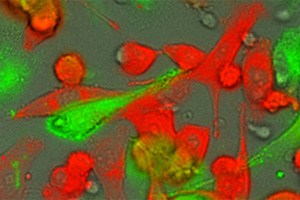
GlaxoSmithKline (GSK) yesterday signed a licensing deal with privately-held UK biotech Immunocore to develop a series of drugs against disease targets that cannot be addressed by antibody drugs.
Immunocore specialises in the development bi-specific biological drugs known as ImmTACs (see image) that combine with T cell receptors, which recognise cancer or virally-infected cells, and antibody fragments targeted against CD3 that can activate the immune system to kill the cells.
Immunocore claims to be the only company in the world that can make the T cell receptors, giving it a key position in a technology that could be used to boost or reawaken innate immune responses to cancer cells.
GSK has offered £142m ($211m) in preclinical milestone payments across a number of drug targets, plus up to £200m in development and commercial milestones for any product that reaches the market.
Under the terms of the agreement, Immunocore will be responsible for all of the preclinical development and for initial clinical trials, while GSK will be responsible for the remaining development and commercialisation of the products.
Laurent Jespers, head of innovation biopharma R&D at GSK, said “ImmTACs offer a tremendous opportunity in treating cancer and in other areas where there is a large unmet medical need.”
The deal is the second major collaboration for Immunocore in as many months, after it signed a broad-ranging cancer drug development deal with Roche subsidiary Genentech with upfront fees of $10m to $20m per target, plus $300m per target in milestones.
At the time, Immunocore chief executive James Noble predicted that the first deal would bring other partners out of the woodwork, while analysts suggested it could turn out to be a multibillion dollar deal if the ImmTAC technology passes proof-of-principle testing.
Immunocore is also advancing its own in-house product candidate – IMCgp100 – which is in a phase I/II dose finding trial in patients with late-stage malignant melanoma.
Last November the Abingdon-based firm was given a £2.4m grant from the UK government-backed Biomedical Catalyst fund, saying it would use the funds to advance an ImmTAC therapy for prostate cancer into development.




